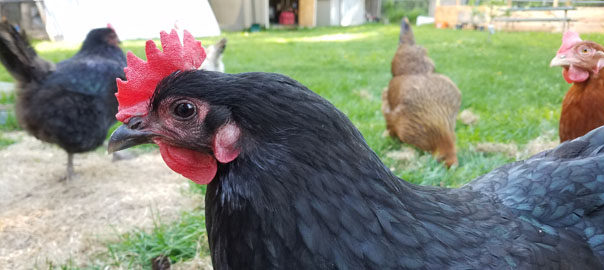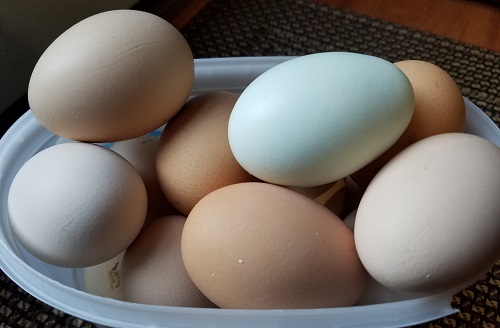Don’t get me wrong – I love having chickens.
But owning any animal comes with responsibilities and potential drawbacks you should be aware of. If you’re thinking about getting backyard chickens for the first time, here are some serious things to consider.
1. Poop. Everywhere.
If you’re planning on letting your backyard urban chickens free roam around your yard, expect to find poop everywhere. Seriously – everywhere.
While most of the time it’s not that big of a deal to me, when I’m in the mood to just relax outside in my sandals and enjoy a beer, it gets annoying having to watch my step.
I talk more about chicken poop management and chicken keeper challenges in detail in this video.
2. They like to dig dirt holes.
Taking dirt baths is an important part of chicken personal hygiene. But when you’re talking about free-ranging chickens, that usually means you’ll find little patches of dug up dirt around the yard.
These dirt holes are nowhere near as big or deep as a naughty dog would dig. But it’s still something to consider.
This videos gives you an idea of the size/look of these dirt patches:
3. They’ll eat your garden.
In addition to eating grass, weeds and harmful garden pests (like slugs!), backyard chickens also love to eat beet greens, kale, lettuce, flower beds, and everything in between.
Prepare to fence off any areas where you don’t want chickens to peck and scratch.
4. Chickens can have medical issues just like any other animal.
This is probably the most serious downside of having chickens to consider.
Before you get chickens, keep in mind that they can get medical complications like just dogs or cats or any other animal. And we all know how expensive a single vet trip can be.
If you have a chicken with a prolapse vent or bound egg (yes – sometimes eggs get stuck), you’ll have to make a quick choice whether or not taking that chicken to an avian-specialist vet is worth the cost or if it makes more sense for you to dispatch it at home.
Chickens can also get poultry lice, mites, worms, and more. Sure, many chicken-related medical issues have home remedies. But some don’t. So just be prepared for either occasionally spending money on vet bills or learning how to butcher chickens (or find a friend who can do it for you if it’s an emotional situation).
5. They stop laying eggs in the winter.
During the winter months when there’s less daylight, chickens will stop laying as many eggs. And some chickens will stop laying entirely.
Last summer, I had 9 hens who were producing 8-9 eggs per day in peak summer months with Alaska’s long daylight hours. It was incredible! I was giving dozens to friends, trading eggs for other foods, and discovering the joys of homemade eggnog.
Then came our long, dark winter, and suddenly my 9 prolific layers were only laying 1-2 eggs per day. Even though I was still feeding and caring for 9 chickens, there were days I considered buying eggs from the store (embarrassing, I know).
In states where winter darkness isn’t as long or extreme, your chickens’ laying habits won’t be as affected by the season’s daylight changes. But if you want them to continue laying strong through months with less natural daylight, you’ll need to provide supplemental light.
Benefits of Backyard Hens
Even though there are negatives to urban chicken ownership, there are so many positives, too.
They’re a source of free fertilizer. They eat leftover food scraps. They produce the most amazing eggs – bold orange/yellow yolks with thick, healthy whites. And hey, I think general entertainment should count for something, too.
With adding any new animal to your home, it’s good to be aware of potential issues. For me, the positives outweigh the negatives. For you? You’ll have to weigh that decision for yourself. :)

